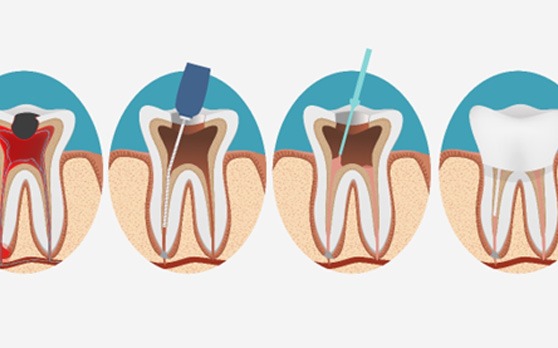Root Canal Therapy – Rockville, MD
Saving Your Compromised Teeth
Here at Rockville Family Dentistry, we know just how annoying and debilitating tooth pain can be! But it also isn’t something that you have to needlessly endure! Dr. Modarres can utilize root canal therapy to save seriously compromised teeth and easily relieve any pain you might be experiencing. If you’re dealing with persistent tooth pain, don’t hesitate to give us a call so we can begin working to get your smile back on track!
Why Choose Rockville Family Dentistry for Root Canal Therapy?
- Comfortable Office with Modern Technology
- Friendly & Experienced Dental Team
- Same-Day Emergency Appointments Available
Do I Need Root Canal Therapy?

As incredible as root canal therapy is, it’s not used for every situation involving tooth pain; instead, the procedure is usually reserved for when a tooth is so severely damaged or decayed that other means of treatment won’t do the trick. You might need a root canal if you’re affected by one or more of the following symptoms:
- Severe, throbbing dental pain
- Tooth sensitivity to extremely hot or cold temperatures
- Pain when biting down
- Swollen, red, or tender gum tissue
- A pimple-like bump on the gums near the painful tooth
The Root Canal Process

Upon arriving for your appointment, our team will administer a local anesthetic to ensure that your mouth is completely numb. Once you’re settled and at ease, a small hole is made in your enamel so that the infected tissue can be removed from inside your tooth. The tooth is then cleaned and sanitized to make sure it’s entirely free of bacteria before being filled back up with a biocompatible material. In most cases, the tooth is topped off with a brand-new crown for additional protection. For many patients, the entire process feels very similar to receiving a dental filling, and you might experience some slight sensitivity for a few days following the procedure.
The Benefits of Getting a Root Canal

If you’re still feeling a little apathetic about root canal therapy, here are a few of the priceless benefits of the procedure:
- Fast and effective relief – Our top priority is providing you with the relief you need so that you can resume daily life without discomfort.
- Salvages your natural tooth – Root canal therapy arguably gives your tooth the absolute best chance to remain inside of your mouth. Not to mention, tooth extractions can sometimes be both costly and time-consuming.
- Protects your overall oral health – Toothaches aren’t just painful; they also pose a threat to the rest of your oral health if left untreated! Root canal therapy promotes optimal oral health moving forward by eliminating the problem.
- Provides beautiful & durable results – Following root canal therapy, a natural-looking and durable crown is attached to the tooth to seal it back up and protect it for many years to come.
Root Canal FAQs

You may know the basics of a root canal in Rockville. However, there’s a good chance you still have concerns about root canal therapy. After all, you likely want details to confirm it’s the right option for you. Therefore, we at Rockville Family Dentistry have listed some answers to frequently-asked root canal questions. Please read them over to learn the therapy’s ins and outs! Should you not find the facts you want, though, don’t worry — call our office or book a visit for help!
Are Root Canals Painful?
True enough, root canal therapy in the past could be painful. Today’s dental tools and methods, fortunately, have come a long way since then. As a result, the procedure is now as comfortable as a standard filling treatment.
You see, Dr. Modarres will ensure your therapy is painless ahead of time. Before it takes place, he’ll numb your mouth with an anesthetic so it can’t feel anything. At most, then, you’ll only sense slight pressure as the root canal progresses.
Admittedly, your treated tooth and jaw might feel sore for a few days after treatment. Still, such discomfort is temporary — it should fade in only two or three days. You can also manage it with over-the-counter pain relievers in the meantime. If the pain worsens after three days, however, call our office; you may be suffering a complication.
Why Do I Need a Root Canal If My Tooth Doesn’t Hurt?
An intense toothache is a common sign you need a root canal, but it’s not the only one. You may have other symptoms you’d want to treat — tooth discoloration, swollen gums, sensitivity to heat or cold, and son.
Besides, having no pain doesn’t mean the tooth is fine. A patient’s dental nerve can “die” from infection and so fail to register discomfort. For this reason, routine checkups are crucial; they let your dentist check for signs you haven’t noticed.
So, get a root canal if a dentist suggests it. Even if the tooth isn’t in pain, treatment will prevent further damage to your smile.
Can Root Canals Be Prevented?
It’s entirely possible to avoid needing a root canal. To do so, just take good care of your oral health! Great habits that’ll help with this practice include:
- Regular Teeth Cleaning: Remember to brush your teeth twice daily, floss them once daily, and rinse them with mouthwash. Also, visit your dentist for checkups and cleanings. These actions will reduce the risk of bacteria reaching a tooth’s pulp.
- Eat a “Mouth Healthy” Diet: Avoid having sugary items that erode enamel. Instead, eat lots of nutritious foods and drink plenty of water.
- Use Oral Appliances: Wear a mouthguard when playing sports and a nightguard while sleeping if you have bruxism. A chipped tooth, in fact, is more vulnerable to harmful oral bacteria.
Can I Take Antibiotics Instead of Getting a Root Canal?
Unfortunately, antibiotics don’t work on tooth infections. Since your bloodstream can’t reach your pearly white’s pulp, the medicine can’t travel to the latter. As a result, it isn’t able to treat an infection there.
If and when your tooth’s pulp is infected, root canal therapy is the only way to treat it. Otherwise, you’ll have to undergo an extraction.

